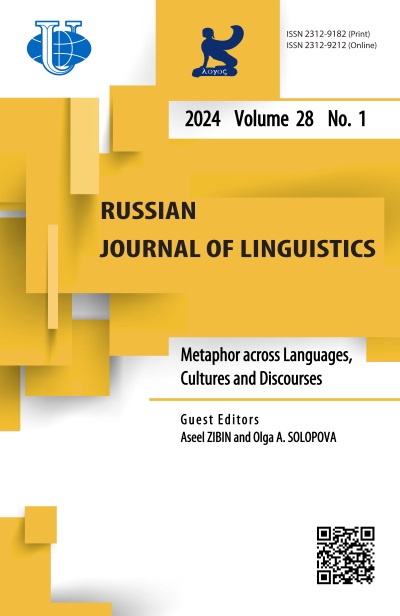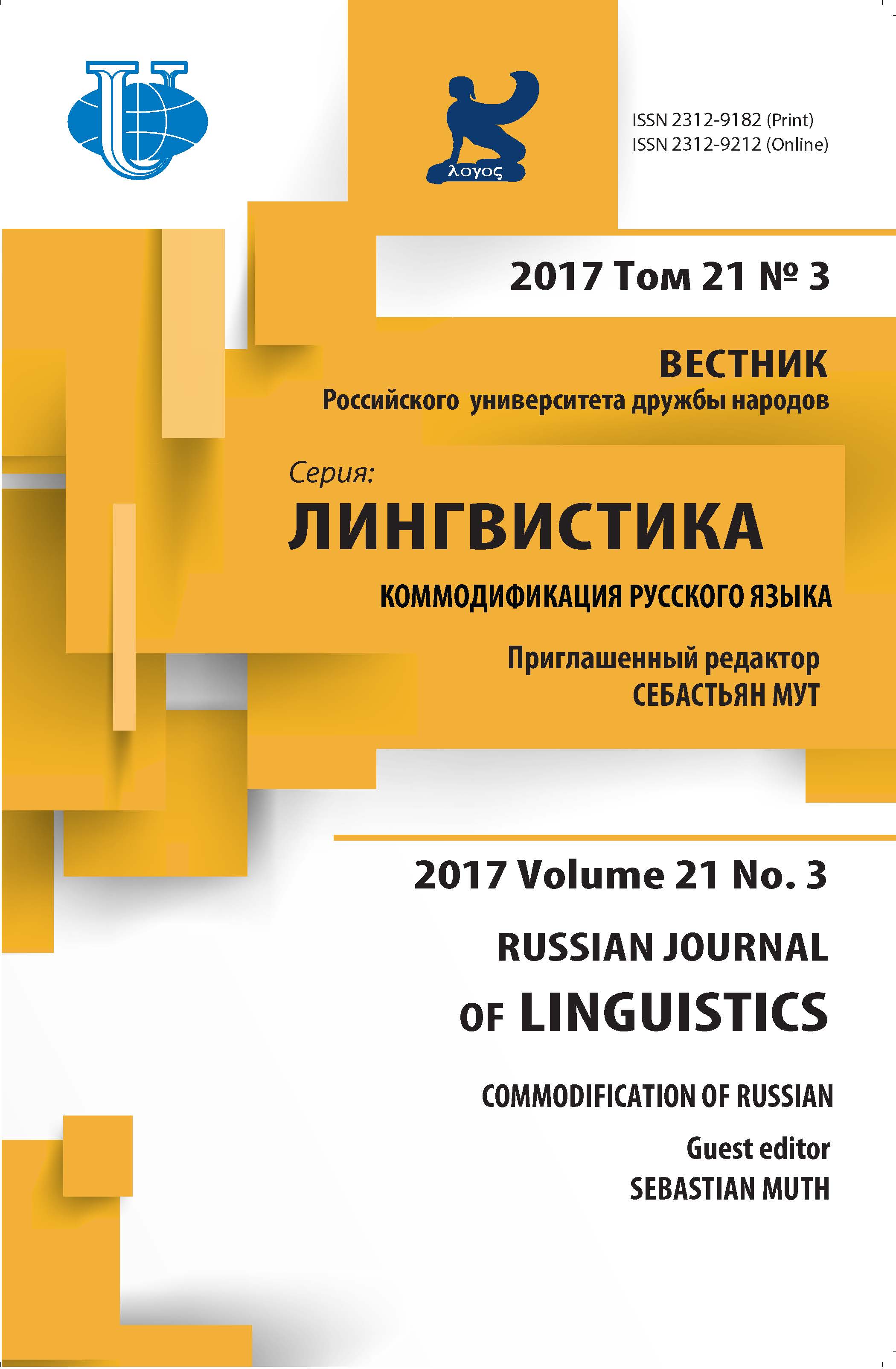RETOUR - AN INNOVATIVE RUSSIAN LANGUAGE TRAINING RESOURSE FOR TOURISM WORKERS IN THE EU
- Authors: Pencheva A.1
-
Affiliations:
- University of National and World Economy
- Issue: Vol 21, No 3 (2017): Commodification of russian
- Pages: 635-652
- Section: Articles
- URL: https://journals.rudn.ru/linguistics/article/view/16795
- DOI: https://doi.org/10.22363/2312-9182-2017-21-3-635-652
Cite item
Full Text
Abstract
Keywords
About the authors
Antonia Pencheva
University of National and World Economy
Email: antonia_pencheva@unwe.eu
Antonia Pencheva, PhD, Senior Lecturer of Foreign Languages and Applied Linguistics Department at the University of National and World Economy, Sofia, Bulgaria. She is Lecturer of Russian in the Diplomatic Institute at the Ministry of Foreign Affairs, Bulgaria. Research interests: comparative linguistics, text linguistics, (more specifically the text of international treaties and documents), business Russian language, intercultural communication, problems of translating artistic and specialized literature. She participates in university- and international scientific projects. UNWE Student Town, 1700 Sofia, Bulgaria
References
- A Memorandum on Lifelong Learning, Commission of the European Communities, Brussels, 30.10.2000 SEC (2000) 1832. URL: http://arhiv.acs.si/dokumenti/Memorandum_on_Lifelong_Learning.pdf. Access date 15.11.2016.
- Bourdieu, P. (1991) Language and Symbolic Power. Cambridge: Polity Press.
- Duchêne, A., Heller, M. (2014) Language in Late Capitalism: Pride and Profit. Applied Linguistics, 35 (5), 617-621. DOI: https://doi.org/10.1093/applin/amu041.
- EUROPE 2020. A strategy for smart, sustainable and inclusive growth. URL: hhttp://eur-lex.europa.eu/ legal-content/EN/TXT/?uri=CELEX%3A52010DC2020. Access date 15.11.2016.
- Europe and beyond, International Journal of Bilingual Education and Bilingualism, 20 (4), 385-403, doi: 10.1080/13670050.2015.1115001.
- Heller, M. The Commodification of Language. Annu. Rev. Anthropol. 2010. 39: 101-114, doi: 10.1146/annurev.anthro.012809.104951.
- Heller, M., Pujolar, J., Duchêne, A. (2014) Linguistic commodification in tourism. Journal of Socio¬linguistics 184, 539-566.
- Pavlenko, A. (2017) Russian-friendly: how Russian became a commodity in Europe and beyond. International Journal of Bilingual Education and Bilingualism, 20 (4), 385-403, doi: 10.1080/13670050.2015.1115001.
- Strietska-Ilina, O. (2005) Tessaring Manfred (eds). Trends and skill needs in tourism. © European Centre for the Development of Vocational Training. URL: http://www.cedefop.europa.eu/en/ publications-and-resources/publications/5161. Access date 15.12.2016.
- Strietska-Ilina, O. (2004) Tessaring Manfred, Dworschak Bernd, Schmidt Susanne Liane, Freikamp Henriette, Mytzek Ralf. International workshop: Trends and skill needs in the tourism sector. URL: http://www.cedefop.europa.eu/EN/Files/2304-att2-1-Halle_2004_Summary.pdf. Access date 15.12.2016.
- Агеева Р.А. Слово - история - культура: вопросы и ответы для школьных олимпиад, студенческих конкурсов и викторин по лингвистике и ономастике. ГЛЭДИС, Инф.-исслед. центр «История фамилии», Науч.-обр. центр «Русист» при каф. рус. яз. Ин-та филологии ТГУ им. Г.Р. Державина. Тамбов: Издательский дом ТГУ имени Г.Р. Державина, 2014. 162 с. [Ageeva, R. (2014) Slovo - istoriya - kul'tura: voprosy i otvety dlya shkol'nykh olimpiad, stu¬dencheskikh konkursov i viktorin po lingvistike i onomastike (Word - History - Culture: ques¬tions and answers for school competitions, student competitions and quizzes in linguistics and onomastics). Pod otv. red. M.V. Gorbanevskogo, V.O. Maksimova, A.S. Shcherbak. Tambov: Izdatel'skii dom TGU imeni G.R. Derzhavina. (In Russ.)]
- Борисова Ц. Защо да учим руски език в България? // г. Руски дневник. 18 ноември 2015 г. URL: https://bg.rbth.com/culture/2015/11/18/zashcho-da-uchim-ruski-ezik-v-blgariya_541791. Дата обращения [15.06.2017]. [Borissova, Ts (2015) Why do we study Russian Language in Bul-garia? Russki dnevnik, 18. Retrieved from: https://bg.rbth.com/culture/2015/11/18/zashcho-da-uchim-ruski-ezik-v-blgariya_541791 (In Bulg.)]
- Вохмина Л. Русский. Экзамен. Туризм. RET-0. Учебный комплекс по русскому языку как иностранному в сфере международного туризма. РЭТ-0, 2007. [Vokhmina, L. (2007) Russkii. Ekzamen. Turizm (Russian. Exam. Tourism.) Uchebnyi kompleks po russkomu yazyku kak inostrannomu v sfere mezhdunarodnogo turizma. (In Russ.)]
- Лапидус Б.А. Проблемы содержания обучения языку в языковом вузе. М.: Высшая школа, 1986, 145 с. [Lapidus, B. (1986) Problemy soderzhaniya obucheniya yazyku v yazykovom vuze (Language learning content at language university). Moscow: Vysshaya shkola. (In Russ.)]
- Павленко А. Русский язык как лингва франка в зарубежной сфере обслуживания // Мир русско¬го слова. 2016. № 1. 23-32. [Pavlenko, A. (2016) Russkii yazyk kak lingva franka v zarubezhnoi sfere obsluzhivaniya (Russian Language as lingua-franca in international clients’ services). Mir russkogo slova, 1, 23-32. (In Russ.)]
- Почеканска С. Настоящее и будущее русского языка в Болгарии // Русский язык за рубежом № 6, 2007 (205). С. 61-69. [Pochekanska, S. (2007) Nastoyashchee i budushchee russkogo yazyka v Bolgarii (Russian language in Bulgaria: actuality and opportunities). Russkii yazyk za Rubezhom, 6 (205), 61-69. (In Russ.)]
- Почеканска С. Русский язык - с детского сада // Стратегия России в XXI веке. 2009. № 6. URL: http://sr.fondedin.ru/new/fullnews_arch_to.php?subaction=showfull &id=1245407386 &archive=1245412075&start_from=&ucat=14&. Дата обращения 15.06.2017 [Pochekanska, S. (2009) Russkii yazyk - s detskogo sada (Russian Language from Nursery).Strategiya Rossii v XXI veke, 6. Retrieved from: http://sr.fondedin.ru/new/fullnews_arch_to.php?subaction= showfull&id=1245407386 &archive=1245412075&start_from=&ucat=14&. (In Russ.)]
- Соколова Е.И. Политика ЕС в сфере непрерывного иноязычного образования // Непрерывное образование: XXI век. Выпуск 2, 2013, doi: 10.15393/j5.art.2013.2086. Дата обращения 15.11.2016. [Sokolova, E. (2013) Politika ES v sfere nepreryvnogo inoyazychnogo obrazovaniia (The EU policy in lifelong foreign language education). Nepreryvnoe obrazovanie: XXI vek, 2. (In Russ.)]. doi: 10.15393/j5.art.2013.2086.
- Трушина Л. Русский. Экзамен. Туризм. РЭТ-1. Учебный комплекс по русскому языку как иностранному в сфере международного туризма. 2015. [Trushina, L. (2015) Russkii. Ekzamen. Turizm. RET-1 (Russian. Exam. Tourism). Uchebnyi kompleks po russkomu yazyku kak ino¬strannomu v sfere mezhdunarodnogo turizma. (In Russ.)]
- Шалпыкова К., Трушина Л. Лексико-грамматический практикум. Учебный комплекс по русскому языку как иностранному в сфере международного туризма. 2008 г. [Shalpykova, K., Trushina, L. (2008) Leksiko-grammaticheskii praktikum. Uchebnyi kompleks po russkomu yazyku kak inostrannomu v sfere mezhdunarodnogo turizma. (In Russ.)]
- Интернет источники
- EF EPI: The world's largest ranking of countries by english skills. URL: http://www.ef.com/epi/ regions/europe/russia. Дата обращения [15.06.2017].
- European Travel Commission (ETC): European Tourism in 2017: Trends & Prospects (Q1/2017). URL: file:///C:/Users/Antonya%20Pencheva/Downloads/ETC+-+Quarterly+Report+Q1-2017.pdf [15.06.2017].
- The most spoken languages worldwide (speakers and native speaker in millions) URL: https://www.statista.com/statistics/266808/the-most-spoken-languages-worldwide. Дата обра¬щения [15.06.2017].
- Новая европейская стратегия «Европа 2020». URL: http://eulaw.ru/content/307. Дата обращения [15.06.2017].
- Новые данные о востребованности русского языка за рубежом (22.06.2016). URL: http://www.pushkin.institute/news/detail.php?ID=4942. Дата обращения [15.06.2017].

















